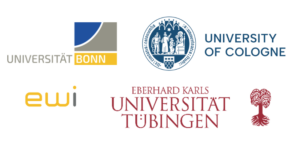High-resolution Earth System monitoring and diagnostics for sustainable applications (HIRES-APP)

The project HIRES-APP (2024–2027) of the Hans-Ertel-Centre for Weather Research (HErZ) is a joint research group of the Universities of Bonn, Cologne and Tübingen. Our research aims at providing basic research for the German Meteorological Service (Deutscher Wetterdienst, DWD) and to initiate and support new developments within DWD. We contribute primarily to the HErZ competence areas Climate monitoring and Earth system forecasting with contributions to Data assimilation and predictability as well as Optimal use of weather and climate information.
Specifically, we aim to derive and apply novel vertical profiling methods for temperature, humidity, winds and turbulence within the troposphere and evaluate their impact on high-resolution regional (re)analysis and short-term weather forecasts. A special focus is on optimally exploiting Unmanned Aerial Systems (UAS) with meteorological payload, state-of-the-art ground-based remote sensing in combination with the new Meteosat Third Generation Sounder (MTG-S1) satellite launched successfully in July 2025. For this we organize the VITAL I & II measurement campaigns.
HIRES-APP also contributes to optimally exploiting weather and climate information for society. With our partner EWI (Institute of Energy Economics at the University of Cologne), a stakeholder-oriented energy index that quantifies the impact of specific weather events (e.g. “Dunkelflauten”) on the energy system is being developed.
HErZ Cologne/Bonn Legacy
HIRES-APP builds upon the legacy of three former HErZ funding phases at the Universities of Cologne and Bonn — the former HErZ for Climate Monitoring and Diagnostics, in which the COSMO reanalyses were initially developed and applied in the context of renewable energy applications.
We continue the work of the previous phases using reanalyses for renewable energy assessments in Germany and Europe. This includes climatological assessments of potential challenges in the production of renewable power, e.g., meteorological situations that are associated with minima in both solar and wind power generation. Further, we explore the limits of meteorological resources for renewable power production on different scales.
A further focus remains on Statistical Post-Processing Approaches in Earth System models.
